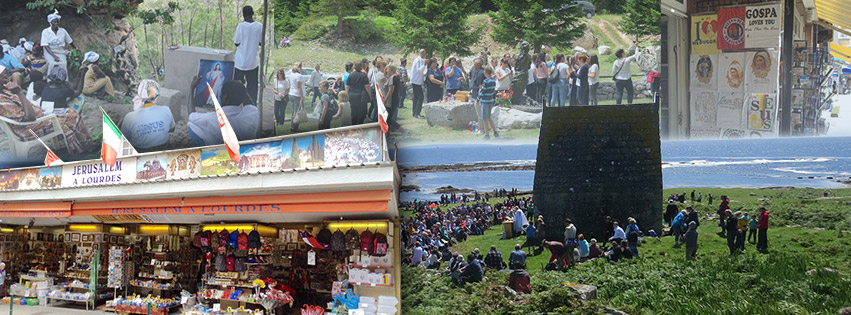Pilgrimage Studies Network
Network was founded in 2018 by John Eade and Mario Katić
Network convenors
Mario Katic, University of Zadar, makatic(at)unizd.hr
Manoël Penicaud, University Aix-Marseille, manoelpenicaud(at)gmail.com
Members of the Scientific Committee
Simon Coleman (University of Toronto) simon.coleman(at)utoronto.ca
Anna Fedele (Lisbon University Institute) fedele.anna(at)gmail.com
Anna Niedźwiedź (Jagiellonian University) annamaria.niedzwiedz(at)gmail.com
Social media convenors
Nimeshika Venkatesan nimeshika.nimmu(at)gmail.com
Chiara Cocco cc80(at)hw.ac.uk
Background
In the rapidly expanding interdisciplinary field of pilgrimage studies, which covers not just religious pilgrimage but other key forms such as secular pilgrimage, spiritual pilgrimage, dark tourism and the relationship between travel, tourism and pilgrimage, many of the theoretical debates and methodological approaches have focused on the European context and most contributors are European in origin (see, for example, Sumption 1975, Turner and Turner 1978, Eickelman and Piscatori 1981, Eade and Sallnow 1991,Morinis 1992,Reader and Walter 1993, Dubisch 1995,Coleman and Elsner 1995, Frey 1998, Coleman and Eade 2004, Reader 2005, Jacobsen 2008, Margry 2008, Kozlowski 2008, Jansen and Notermans 2009, 2012, Sumption 2011, Eade and Katić 2014,Reader 2015, Albera and Eade 2015, 2016, Flaskerud and Natvig 2018).
Scope
By forming this network we want to develop pilgrimage studies by:
(1) developing links and encouraging cooperation between European anthropologists who are working on pilgrimage in different European languages and academic traditions. We hope, thereby, to bring more balance to pilgrimage research by encouraging collaboration between scholars across the region and modifying the dominant position of W. European scholars within pilgrimage studies.
(2) strengthening the connections between European anthropologists and those studying pilgrimage in other areas of the world. We believe that these connections will not only help to promote European anthropological research but also contribute to the development of pilgrimage studies in general by attracting colleagues based outside of Europe to events which we intend to hold.
Until now collaboration and knowledge exchange has been largely based on individual networking and personal acquaintances. This has generated fine academic publications but has sometimes gone unnoticed in related anthropological fields and different European regions. We hope that the network will raise the profile of pilgrimage studies more widely and encourage the dissemination of research and publications across the region. Hence, one of our aims is to organize network events in cooperation with colleagues from European countries where pilgrimage studies is relatively undeveloped.








